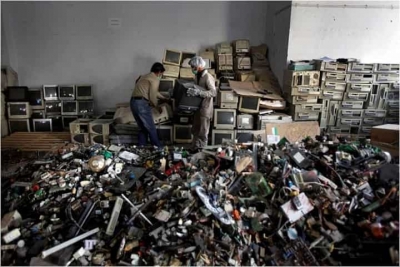Updated e-waste policy in the offing
By IANS | Published: December 23, 2021 09:54 PM2021-12-23T21:54:03+5:302021-12-23T22:05:14+5:30
New Delhi, Dec 23 The Ministry of Environment, Forest and Climate Change will soon bring out an updated ...

Updated e-waste policy in the offing
New Delhi, Dec 23 The Ministry of Environment, Forest and Climate Change will soon bring out an updated and reframed policy on electronic waste that will also help the unorganised sector.
"E-waste (Management) Rules, 2016, enacted since October 1, 2017 have been further strengthened in the new policy, which will bring change in the perception of e-waste recycling market in the country," said Ved Prakash Mishra, Director in the ministry.
Earlier in October, the Centre had come out with draft regulations for Extended Producer Responsibility (EPR) under Rule 9 (1) of Plastic Waste Management Rules, 2016 wherein the EPR shall be applicable to both pre-consumer and post-consumer plastic packaging waste.
Stating that electrical and electronic waste with its rich content of valuable metals can act as a major harvest point, Mishra said, "India is currently the world's third largest producer of e-waste after the US and China, but with a very low e-waste recycling facility. Presently, only 300 recyclers are registered in the country but the rate of e-waste collection is very high in India owing to its valuable content."
Unfortunately, the collection and recycling of e-waste is predominantly being done by the informal or unorganised labour through highly environmentally degradative ways, which cause serious health hazards, he said, adding, "The new policy will help formalise the unorganized sector and strengthen the organised recycling units."
Mishra was speaking at an interaction on e-waste management organised by Pegasus Waste Management Pvt Ltd, an integrated e-waste recycling company late on Wednesday evening, a release from the company said.
E-waste (Management) Rules, 2016, enacted since October 1, 2017, had strengthened the then existing rules. Over 21 products were included under the purview of the rule. The rule also extended its purview to components or consumables or parts or spares of Electrical and Electronic Equipment (EEE), along with their products.
EPR extends the responsibility of producers beyond the consumer stage for collection, storage, transportation and environmentally sound dismantling and recycling of e-waste and creating awareness among consumers through the instrument of EPR authorisation.
"The public and Resident Welfare Associations should also come forward as most of the e-waste lie in people's houses. The government should give incentives for buying new electronic products if one disposes of the old e-waste," said Sandeep Kumar, Regional Director (Gurgaon South), Haryana State Pollution Control Board.
All e-waste is valuable as it is highly rich in metals such as copper, iron, tin, nickel, lead, zinc, silver, gold, and palladium.
"But due to lack of awareness, the consumers are selling their e-waste to the unorganised sector, which extracts these precious metals and sells the balance e-waste to recyclers, which does not make recycling viable for the recycler," said Praveen Bhargava, CEO, Pegasus Waste Management Pvt Ltd.
Disclaimer: This post has been auto-published from an agency feed without any modifications to the text and has not been reviewed by an editor
Open in app